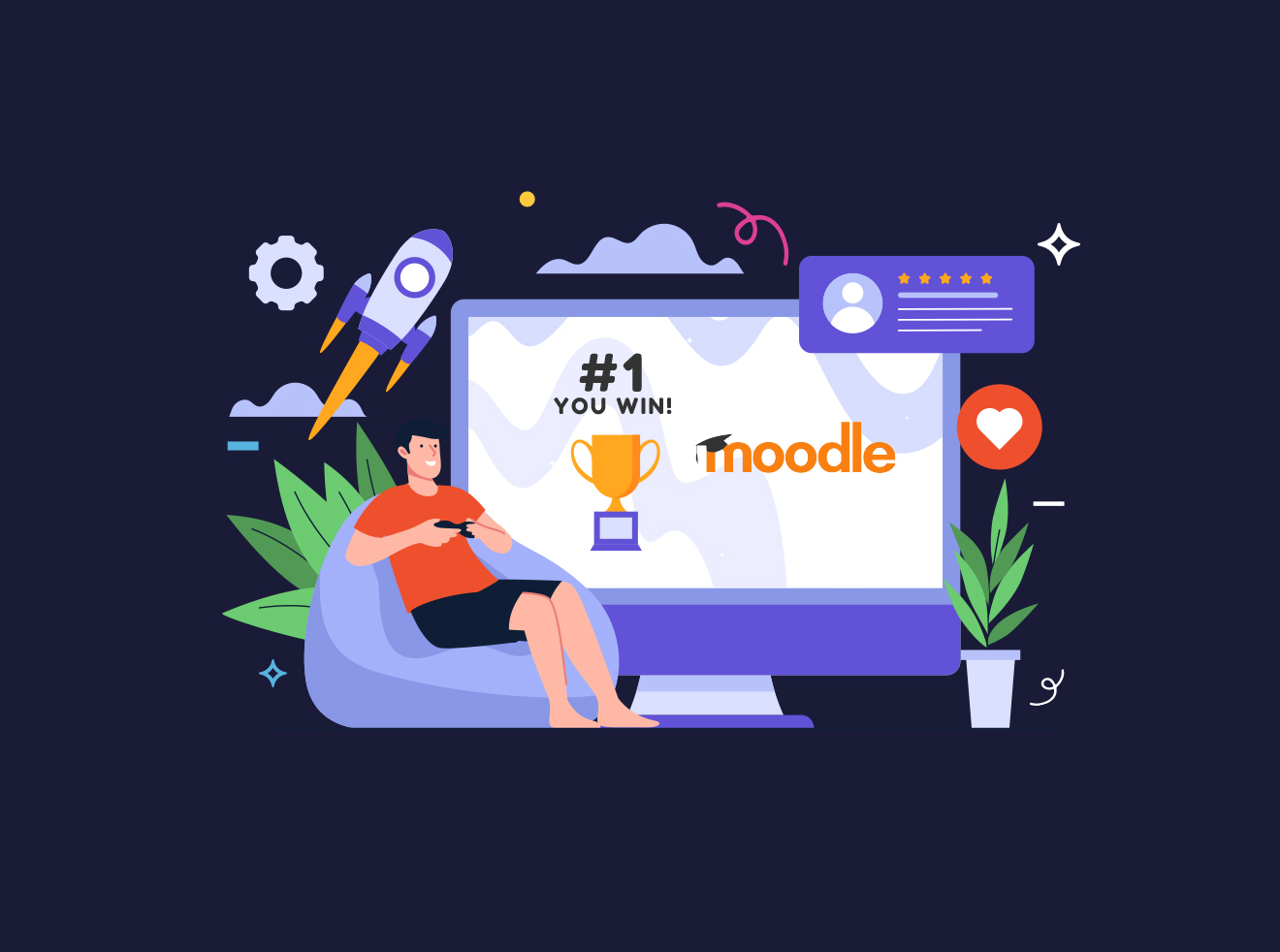A learning management system (LMS) is an application software that aids in the management, delivery, and tracking of educational materials. LMSs can be used to set up online courses, allocate and grade homework, and give students feedback.
Educators and trainers use learning management systems to generate and manage digital content, such as text, video, audio, and interactive features. Additionally, they can provide collaboration and communication options like message boards, forums, and discussion boards.
When it comes to choosing an LMS, there are various options accessible, including open-source, SaaS, and custom or tailored-made platforms.
Open-source LMSs are community-driven and are free to use and modify. Moodle and LearnDash are two examples of open-source LMS. Open-source LMSs are frequently adaptable and have a sizable user and developer community that contributes to the platform. They do, however, require technical knowledge for installation and maintenance, and they may not provide the same degree of support and integration as more commercial choices.
SaaS (Software as a Service) LMSs are cloud-based and often subscription-based. Blackboard and Canvas are two examples of SaaS LMSs. SaaS LMSs are simple to set up and don’t require much technical knowledge. Additionally, they are scalable and accessible from any location with an internet connection. However, they are often more expensive, can have restrictions on data ownership and control, and they might not be as flexible as an open-source or custom LMS.
Finally, there are custom learning management systems, which are created specifically to satisfy an organization’s or individual’s demands. They are constructed from scratch to meet specific needs so that organizations can fully control the learning experience they provide. They can also set up the necessary interactions with tools and systems that the organization prefers to work with.
In this article, we will take a look at what a custom LMS is and analyze its advantages and disadvantages to help you determine whether a custom LMS is the best option for your organization.
The Advantages of a Custom LMS
When deciding which LMS to use, corporations occasionally ask “Will this platform suit our organization’s requirements?” That is a great question because, in some cases, adopting an LMS to suit all of your objectives may necessitate developing custom programming.
The ability to modify the functionality of your eLearning platform so that your business can efficiently handle customized training is the key benefit of having your LMS developed specifically for you.
By using a specially designed learning management system, you can systematically deal with these problems and completely tailor your online training platform to suit your particular requirements.
Large corporations, government bodies, and educational institutions are examples of organizations that have a custom LMS. These organizations frequently have unique learning requirements that are not satisfied by pre-built LMSs and necessitate a significant degree of customization.
Now let’s look at the top advantages of customizing an LMS.
Flexibility:
A custom LMS is designed to meet the specific demands of an organization. This implies that it may be customized to meet the particular learning needs of the organization and that it can be made to work with other tools and systems. This level of flexibility enables organizations to design a learning platform that is exactly tailored to their requirements.
Scalability:
A custom LMS can be built to support a large number of users and a significant amount of content, and be modified as the needs of the organization evolve. This scalability is crucial for organizations that are preparing for foreseeable growth.
Unique Functionality:
A custom LMS can be designed with specific functionality to fit the organization’s specific learning goals. For instance, a personalized learning management system could be created with elements like a complex gamification system or personalized learning.
You can choose what features to add or remove and what the ideal user interface should be like as the owner and primary user of the LMS.
Branding and Design:
An organization’s branding and design can be best represented with a personalized LMS, however you should keep in mind that many learning management systems already in the market do allow for design customization. Ultimately a unique design can boost customer trust in the brand and help students recognize it.

Integration:
A customized LMS can be integrated with other systems and technologies used by an organization. This includes additional software, like enterprise resource planning (ERP) or customer relationship management (CRM) systems, as well as hardware, like mobile devices or virtual reality headsets. Processes may be streamlined as a result of this integration, which will also enhance learning in general.
Security:
Open-source LMS are used out-of-the-box by hundreds of users, and with code easily accessible for all, they can be easy targets for security threats. This is a big concern, especially for government agencies and corporations looking for a solutions to deliver training, without compromising delicate information.
To suit the demands of an organization, a custom LMS can be created with stronger security measures in mind. This may involve taking precautions like two-factor authentication, encryption, and role-based access control. Sensitive data can be protected and rules can be followed with this level of protection.
If this is the path you want to go for, you should keep in mind that creating a custom LMS however is no easy task, and must bemanaged by a group of qualified LMS developers. A professional team includes designers, engineers, testers, and a project manager.
Disadvantages of a Custom LMS
Nothing is perfect and using a custom LMS has a number of drawbacks compared to using an LMS plugin or SaaS LMS. Here are some disadvantages you should keep in mind.
Cost:
Creating a custom LMS can be an expensive endeavor, however adopting a WordPress LMS plugin is often more affordable. Large upfront costs associated with a custom LMS can be a significant barrier for some organizations, particularly small and midsized businesses. This disadvantage is magnified specially for smaller businesses, since in most cases their needs can be met using a ready-made platform.
The price includes not just the original development but also continuous upkeep and improvements. Even support and maintenance can become a great expense, since only a specialized team will be capable of performing said tasks.

Before opting for a custom platform, you should seriously consider if you require the level of specialization or customization that will be associated with a greater cost.
Development Time:
A custom LMS can take a long time to create. This is due to the fact that the system must be created from scratch and tested before it can be used. This could postpone the start of the educational program and raise the project’s final cost. If your company needs to quickly deploy an LMS, this may be a serious drawback.
Maintenance and Upkeep:
A customized LMS needs constant upkeep and maintenance. This includes frequent backups, security fixes, and upgrades. In addition, it entails diagnosing and addressing any problems that might occur. This can take time and necessitate specific knowledge. Maintenance tasks will often only be able to be completed by the team that developed the platform or the organization will have to invest in training inhouse IT or development team to handle support.
Community Support:
A custom LMS may not have as much support as other types of LMSs. This might make it challenging for organizations to find assistance when problems develop. Additionally, it might make it challenging for organizations to remain current with new features and capabilities.
As opposed to open-source LMS, a custom LMS may not have the same sizeable user and developer community that can offer assistance and share best practices. The majority of pre-built WordPress LMS plugins offer a dedicated support staff that is there to help and debug any problems you may encounter. You could have to depend on the development team that made your custom LMS since it might not have this kind of support.
Integration:
In comparison to commercially available LMSs, a custom LMS would not be able to integrate with as many third-party products and services, if they are not considered in the original scope of works. Making changes to the platform down the road can be complicated, time consuming and expensive. This may restrict the system’s functioning and make it more challenging for organizations to provide specific types of learning experiences.
When Should You Choose a Custom LMS?

There are several scenarios where using a custom Learning Management System (LMS) can be more convenient than an out-of-the-box solution:
- Unique requirements: If you have unique requirements that are not addressed by an out-of-the-box LMS, a custom solution may be the best option. For example, if you require a specific set of features or functionality that are not provided by existing LMSs, or if you need to integrate your LMS with other systems or databases, a custom solution may be the best way to meet your needs.
- Specific branding or user interface: If you require a specific branding or user interface for your LMS, a custom solution may be the best option. For example, if you need to align the look and feel of your LMS with your organization’s brand guidelines, a custom solution may be the best way to achieve this.
- Scalability and flexibility: If you need a scalable and flexible LMS that can adapt to changing needs and requirements, a custom solution may be the best option. Custom LMSs can be designed to accommodate growth and changes in your organization, ensuring that your LMS is always up-to-date and able to meet your needs.
- Regulatory or compliance requirements: If your organization has specific regulatory or compliance requirements that must be met, a custom LMS can be designed to meet these requirements. For example, if you need to ensure that your LMS meets specific accessibility standards or data privacy regulations, a custom solution may be the best way to achieve compliance.
- Cost-effectiveness: In some cases, a custom LMS can be more cost-effective than an out-of-the-box solution. This is particularly true if you only require a limited set of features or functionality and do not want to pay for features you do not need.
Assessing your needs
It is vital to note that a custom LMS may necessitate more technical skills as well as a larger budget for creation, testing, and maintenance. The organization should have a clear plan for how the system will be used and maintained over the long term as it is a long-term investment.
While a custom LMS can be more expensive, it may be the ideal solution for organizations with unique needs or those require a high level of customisation. Before choosing a learning management system (LMS), it’s important to compare the advantages and disadvantages of both a custom LMS and an off-the-shelf solution.
When deciding between a custom LMS and an off-the-shelf solution, it’s also important to consider your organization’s specific objectives and requirements. A custom LMS might be the ideal option if your organization has particular operational requirements, complicated course delivery, a large number of users, demands particular branding and design, wants mobile compatibility, or intends to grow in the future.
The Golden Mean
After working on hundreds of eLearning sites of all shapes and sizes, we have come to the conclusion that customizing an open-source LMS is often the best choice for most of our clients. This option delivers both cost-effectiveness and ease of use as well as great flexibility.
Customizing an open-source LMS can be a better option than creating a custom LMS from scratch for several reasons:
- Cost savings: Open-source LMSs are generally free to use and can significantly reduce development costs compared to building a custom LMS from scratch. This is because you can leverage the existing codebase and community support for open-source LMSs, reducing the time and effort required to build and maintain a custom solution.
- Faster time to market: Customizing an open-source LMS can be a faster option than building a custom LMS from scratch. Open-source LMSs come with pre-built features and functionality that can be tailored to your specific needs. This means that you can get your LMS up and running quickly and focus on customizing the features that are most important to your organization.
- Community support: Open-source LMSs have a strong community of developers and users who can provide support and assistance. This can be beneficial for organizations that do not have a large development team or in-house expertise in LMS development.
- Flexibility: Customizing an open-source LMS can provide a high degree of flexibility. Open-source LMSs are designed to be modular, which means you can choose which features and functionality to include in your LMS. This can be beneficial for organizations that require specific functionality or have unique requirements.
- Security: Open-source LMSs are typically well-supported and have regular updates and patches to address security vulnerabilities. This can help to ensure that your LMS is secure and protected against potential threats.
However, it’s important to choose an open-source LMS that meets your specific needs and has a strong community of developers and users to provide ongoing support and maintenance.
Conclusion
From one organization to another, online training programs have different characteristics, contents, and objectives. An excellent way to design an eLearning program that perfectly meets your unique requirements and goals is through custom development. However, we also recommend considering the possibility of customizing a pre-existing LMS.
If your organization is thinking about building an LMS from scratch or customizing your current platform, our team of LMS experts can assist you in getting all your questions answered and resolving all of your problems.




